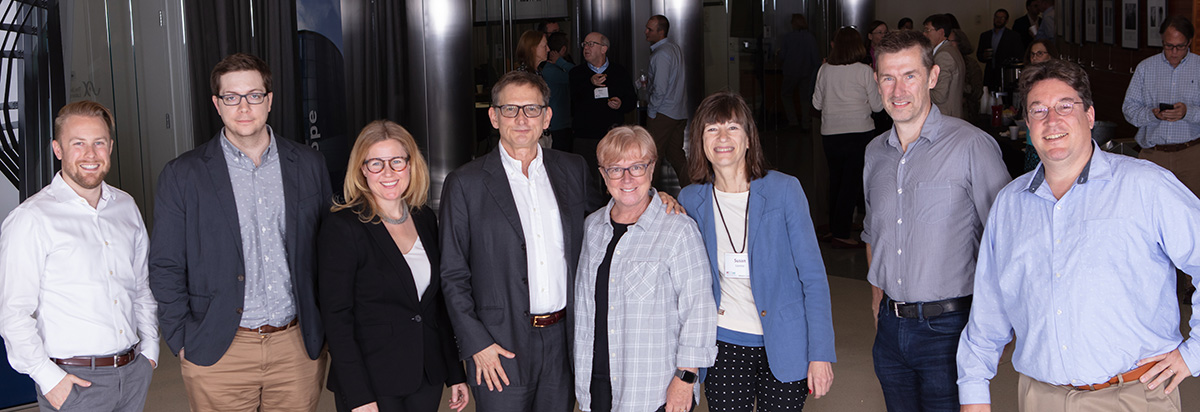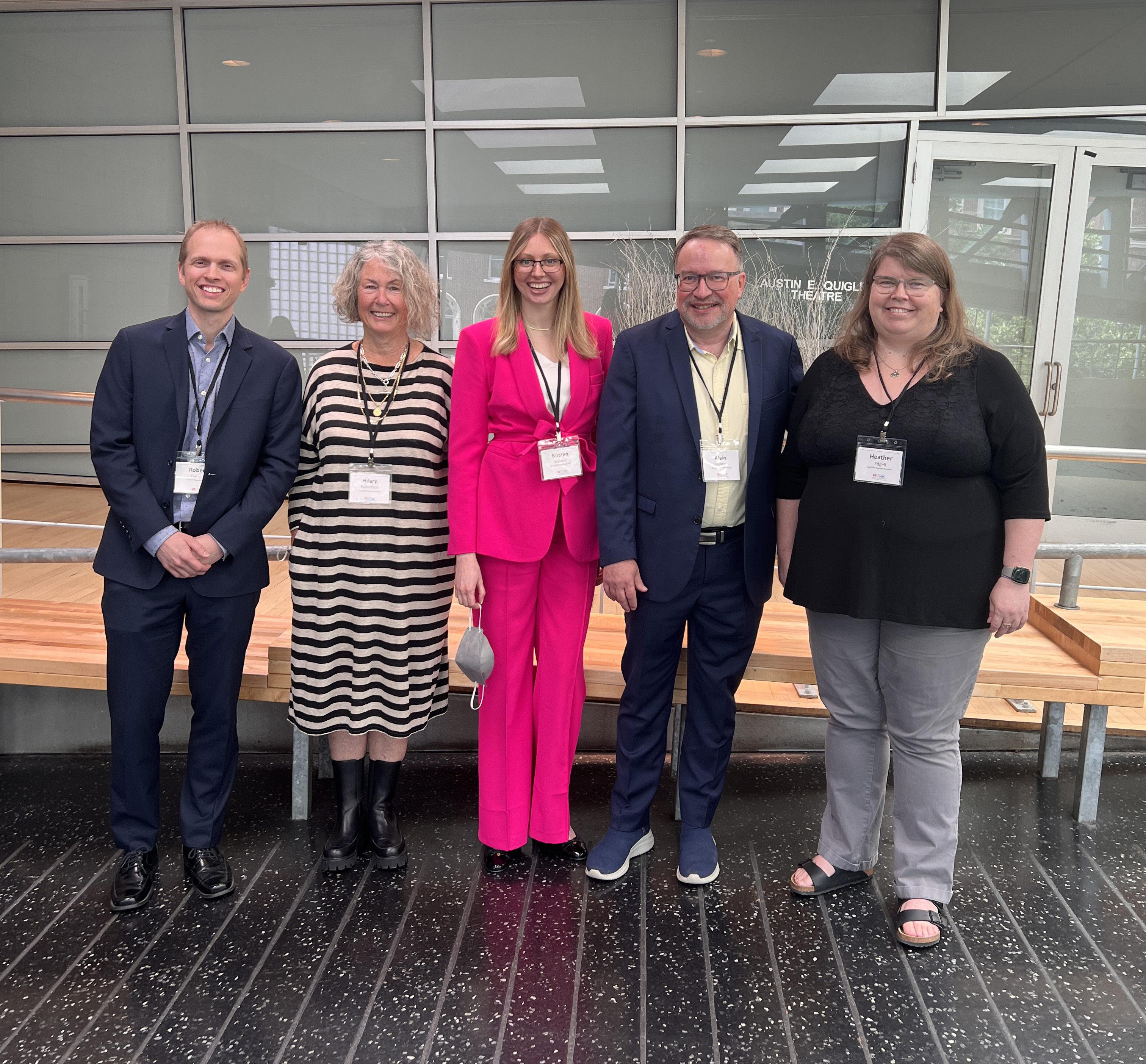Research Centers
The National Institutes of Health (NIH) awarded grants to one Collaborative Research Center (CRC) and one Data Management Coordinating Center.

 The Columbia Center for Solutions for ME/CFS team
The Columbia Center for Solutions for ME/CFS team
Partnerships
Columbia University proudly partners with Brigham & Women's Hospital, the Uniformed Services University, the University of California, Davis, the University of Edinburgh, and physician Susan Levine to promote community engagement in its research efforts.
Please visit the Community Page of the CfS for ME/CFS website on the Center for Infection and Immunity's website for more information about community outreach and resources.

Molecular Correlates of Symptoms Severity in ME/CFS
The goal of this project is to assess whether changes in antibody titers in people with ME/CFS correlate with changes in clinical status. It is believed that biomarkers may vary in concentration or presence as a function of clinical status. To test this theory, 60 people with ME/CFS and 60 healthy controls will use a mobile app to document their clinical symptoms for a year. The mobile app will ask specific questions from participants. Responses that indicate a significant status change will trigger a follow-up visit from a clinical coordinator. This coordinator will collect blood, saliva, and feces samples from the participant at the initial appointment, and at follow-up 2-3 weeks later. Samples will be analyzed to determine whether metabolic, proteomic, microbiological, and transcriptomic abnormalities are maximal on the days of initial negative status change, and whether antibody titer changes are seen in the 2-3 weeks following this status change. Changes in symptoms and antibody titer may indicate primary or reactivation of infection.
This project will explore the molecular correlates of symptom severity in ME/CFS.
Genotype Analysis of ME/CFS
The goal of this project is to identify genetic variants whose frequencies significantly differ between people with ME/CFS and healthy controls. In partnership with the Solve ME/CFS Initiative, 5,000 US-based people with ME/CFS will be recruited as cases; the Kaiser Permanente Research Bank will be used to recruit healthy US-based controls. A genome-wide association study (GWAS) will be conducted on these participants to identify DNA variants that may be associated with ME/CFS. GWAS analysis will be compared to the DecodeME UK study. These results will be used to generate new hypotheses regarding the genes, biological mechanisms, and cell types that contribute to ME/CFS disease etiology and may potentially identify future therapeutic targets.
This project is in partnership with the Solve ME/CFS Initiative, the Kaiser Permanente Research Bank, and the DecodeME UK ME/CFS study and will identify genetics variants that differ between people with ME/CFS and healthy controls.
Pathogen Discovery Through Longitudinal Serological Surveillance in ME/CFS
This study will conduct prospective serological surveillance to determine whether people with ME/CFS are more likely than controls to have immunological evidence of exposure to one or more microbial organisms prior to diagnosis with ME/CFS. Serological samples from 400 people with ME/CFS and 400 controls stored in the Department of Defense Serum Repository will be used in the analysis. Cases will be identified using medical code ICD-10-M for chronic fatigue, with only samples from 2007-2020 included, to avoid inclusion of any Long-COVID cases. All samples will be analyzed using unbiased, comprehensive assays for antibodies to infectious agents. It is theorized that a subset of subjects with chronic fatigue will also have immunological evidence of exposure to microbial organisms prior to diagnosis with chronic fatigue.
This project will use longitudinal serological surveillance to uncover insights into the causes of ME/CFS.
Interested in participating in research?

 The Cornell ME/CFS CRC team Credit: Dave Burbank, Cornell Photography
The Cornell ME/CFS CRC team Credit: Dave Burbank, Cornell Photography
Partnerships
Cornell University is collaborating with Ben Cosgrove, PhD, and Iwijn De Vlaminck, PhD, from the Cornell Meinig School of Biomedical Engineering and Dawei Li from Texas Tech University Health Sciences Center. Physician Susan Levine is screening individuals for inclusion in the studies, and David Fernandez, MD, Laura Donlin, PhD, and Yoshimi Endo, MD, oversee patient interactions at the Hospital for Special Surgery.
 Photo by Dave Burbank
Photo by Dave Burbank
 Photo by Dave Burbank
Photo by Dave Burbank





Dissecting Myogenic-Endothelial-Immune Interactomes in Human ME/CFS Skeletal Muscles (Lead, Dr. Ben Cosgrove)
The goal of this project is to identify molecular and cellular alterations present in ME/CFS skeletal muscles through innovative approaches to capture the transcriptome and epigenome with single-cell and spatial resolution in human biopsies. Using single nuclei isolated from muscle biopsies, the genes expressed in each cell, and the configuration of chromosomes in each cell, will be determined. Gene expression information will also be obtained from small regions of cross-sections (slices) of muscle tissue (spatial transcriptomics). All of this information will be used to determine whether specific types of muscle-resident cells are dysregulated at the transcriptional and epigenetic levels in people with ME/CFS compared to healthy controls.
This project will be led by Dr. Ben Cosgrove, who will collaborate with Dr. Iwijn De Vlaminck. Both are faculty in the Cornell Meinig School of Biomedical Engineering. Molecular data analysis will also occur through a collaboration with Dr. Jen Grenier, the Genomics Core Lead, who heads the Cornell Genomics Innovation Hub.
Circulating Signals of ME/CFS (Lead, Dr. Maureen Hanson)
The goal of this project is to determine whether RNA released into the plasma after exercise is different between people with ME/CFs and healthy controls. We will examine cell-free RNA (cfRNA) from blood collected from 173 participants in the first phase of our NIH Center (2017–2023). Our premise is that identification of the cell types of origin of cfRNA in people with ME/CFS and healthy controls before and after exercise may provide clues about disruptions that happen after people with ME/CFS increase their activity levels. Learning which cell types have altered patterns of injury and cell death in ME/CFS may reveal immune and tissue involvement in the pathophysiology of post-exertional malaise (PEM).
Our team will also examine the proteins in extracellular vesicles (EVs), before and after exercise, to see whether proteins present in EVs are different in people with ME/CFS from those in healthy controls. The team will also isolate EVs from platelets, neuronal cells, and blood vessels.
This project will be led by Dr. Maureen Hanson from the Cornell Center for Enervating NeuroImmune Disease. Dr. Iwijn De Vlaminck’s group in the Meinig School of Biomedical Engineering will be responsible for cfRNA analysis. This study will include multi-omic analysis of data from the original and new cohort.
Immune Dysfunction in ME/CFS (Lead, Dr. Andrew Grimson)
The goal of this project is to comprehensively investigate monocyte and platelet abnormalities in ME/CFS. Our team will use multi-omic approaches to identify gene regulatory changes in monocytes. We will also test whether ME/CFS causes alterations in the ability of monocytes to migrate and differentiate into macrophages, a critical function of monocytes.
We will complete the following as part of our investigation of platelet abnormalities: examine the platelet transcriptome, perform assays to test platelet function, and examine interactions between platelets and other immune cells in ME/CFS that might contribute to their altered state in ME/CFS. We will also assess whether the cargo of platelet-derived EVs is altered in ME/CFS, complementing the analysis of platelets themselves.
This project is based on previous work at the Center, which discovered that people with ME/CFS had abnormalities in monocytes and platelets. Our current work will examine interactions between platelets and other immune cells in ME/CFS that might contribute to their altered state.
This project will be led by Dr. Andrew Grimson, an Associate Professor at Cornell University, in collaboration with Dr. Maureen Hanson's group and Dr. Dawei Li, an Associate Professor at Texas Tech University Health Sciences Center. Dr. Grimson’s lab will use a combination of genomic and functional assays to investigate components of the immune system in ME/CFS, working closely with Dr. Li, a computational biologist. The genomics assays will be performed in partnership with Dr. Jen Grenier, who leads our Research Core component of the Center.
Interested in participating in research?

The activities of the network are centered around three strategic pillars:
- Build a catalyst-accelerator program to fill existing gaps in ME research, stimulate new discoveries and sustain excellence in ME research in Canada.
- Develop a sustainable research infrastructure for ME and implement the integration and standardization of databases and biobanking procedures.
- Develop talent to enhance ME research capacity and excellence in research.
The network will play an important role in coordinating efforts of Canadian and international stakeholders, and transforming the ME research landscape in Canada and beyond.
 The Jackson Laboratory ME/CFS Research Team
The Jackson Laboratory ME/CFS Research Team
Partnerships
The ICanCME Research Network has formed partnerships with three national organizations, Millions Missing Canada, Action CIND, and the National ME/FM Action Network, as well with several provincial ME organizations including l'Association Québécoise de l'Encéphalomyélite Myalgique (AQEM), the ME/FM Society of BC, and the broader patient community to initiate, develop and sustain an ME research ecosystem across Canada.

Dr. Moreau is an internationally recognized expert on the molecular genetics of pediatric scoliosis. His discoveries led to multiple peer-reviewed papers, international conferences as a guest speaker, several awards as well as 60 patents covering innovative diagnostic tests and therapeutic molecules. Dr. Moreau is the co-founder and Chief Scientific Officer of Inception Therapeutic Inc., a start-up based in Montreal developing diagnostic tests for primary osteoarthritis and new disease-modifying osteoarthritis drugs. Dr. Moreau’s primary research interests also target other complex adult diseases such as osteoarthritis and myalgic encephalomyelitis.

Interested in participating in research?

 RTI Data Management and Coordinating Center team
RTI Data Management and Coordinating Center team
Partnerships
RTI is partnering with Solve ME/CFS Initiative to engage the patient community in its research efforts.



Interested in participating in research?

